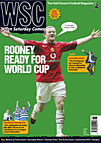 Manchester United's new deal with AIG is set to net them £14.1m a year. Steve Menary reports on the big business that is shirt sponsorship
Manchester United's new deal with AIG is set to net them £14.1m a year. Steve Menary reports on the big business that is shirt sponsorship
That sponsorship is taking over football is a routine gripe from fans, but clubs are unlikely to agree. The total value of shirt sponsorship across the top flights of England, France, Italy, Germany, the Netherlands and Spain is £238 million this season, according to consultant Sports+Markt. That figure is 40 per cent up on 2000-01; no wonder Manchester United squeezed every pip out of their latest deal.
United’s £14.1m a year, four-season deal with American International Group is £5.1m a season more than previously paid by Vodafone and the biggest in the UK – but not Europe. Libyan oil firm Tamoil pays £15.3m a season to sponsor Juventus, while Deutsche Telekom lays out £17.8m to stick T-Com on Bayern Munich’s shirts. According to S+M, United’s latest deal is also ahead of the £10.1m a season Chelsea receive from Samsung Mobile and Real Madrid’s £9.1m-a-year Siemens deal.
S+M has developed a sponsorship evaluation tool for clubs to evaluate intangibles, such as the value of playing in Europe, the Premiership or media coverage. Account director Gareth Moore explains: “Shirt sponsorship is not the same as advertising – that’s an exclusive zone. Shirt sponsorship is in a competitive environment with other shirts and hoardings so you have to discount that from the value.”
Some media-savvy directors are already taking a similar approach. Bradford’s nine-year deal with local car dealer JCT600 is ending. As Peter Etherington – West Ham star Matthew’s father – is putting £2.5m into the Bantams, he is taking charge of the new deal himself. He says: “We look at what other clubs in our league and area get and media coverage and quantify that to work out a media value. But one of the first things I ask a sponsor is, ‘Why Bradford?’ There’s a reason for sponsoring a club and I want to know what it is so the club are not sold short.”
Vodafone is – for now – the most recognised shirt sponsor in the Premiership according to S+M, but that probably does little for mobile sales in the blue half of Manchester. “When we started a shirt sponsorship deal with Derby our sales definitely went down in Nottingham,” says Justin Way, brands manager at Wolverhampton & Dudley Brewery (WDB). Derby’s deal with WDB brew Marstons lapsed last season and the brewers’ only shirt sponsorship deal is with Walsall. Despite relegation to League Two, the Saddlers will be wearing Banks beer logos for a while yet. Mr Way added: “If we stuck Banks on a Blues shirt, no one would want to drink Banks but it’s not the same with Walsall – they’re everyone’s favourite second club in the Midlands. We’ve had a relationship with Walsall for 12 years. The last year of our existing five-year deal is next season and we’ll sit down with the club. Just because you’ve been relegated, you don’t change your support.”
That deal could be renegotiated down, though, as the Saddlers only recently dropped out of the Championship, where shirt sponsorship deals average between £200,000 and £300,000. In League One, sponsorship averages up to £200,000, but it sinks below half that figure in League Two.
Like TV rights, shirt sponsorship deals tend to favour the elite and the average deal in the Premiership is £1m according to S+M. Even that figure is boosted by big clubs, with 80 per cent of total Premiership shirt sponsorship generated by United, Arsenal, Chelsea, Liverpool, Newcastle and Spurs.
To compete against this tide, League of Wales side Llansantffraid opted to let the marketplace decide by auctioning naming rights to the entire club on eBay after sponsor TNS was bought out by BT. “Maybe there’s a company out there who can reap the benefits that TNS has had through the sponsorship of the club,” said club general manager Ian Williams.
In the nine years since TNS bought the naming rights, the firm’s turnover ballooned from £5m to £25m. The club regularly play in Europe and had a Champions League qualifier against holders Liverpool this season and a 2003 UEFA Cup tie with Manchester City, providing good coverage for TNS.
A week before the auction’s close, the club had nearly 100 bids with the highest at £250,000 a season, providing plenty of food for thought for commercial managers.
From WSC 232 June 2006. What was happening this month
5 years on I'm sure Bradford would want to take any deal that's going!